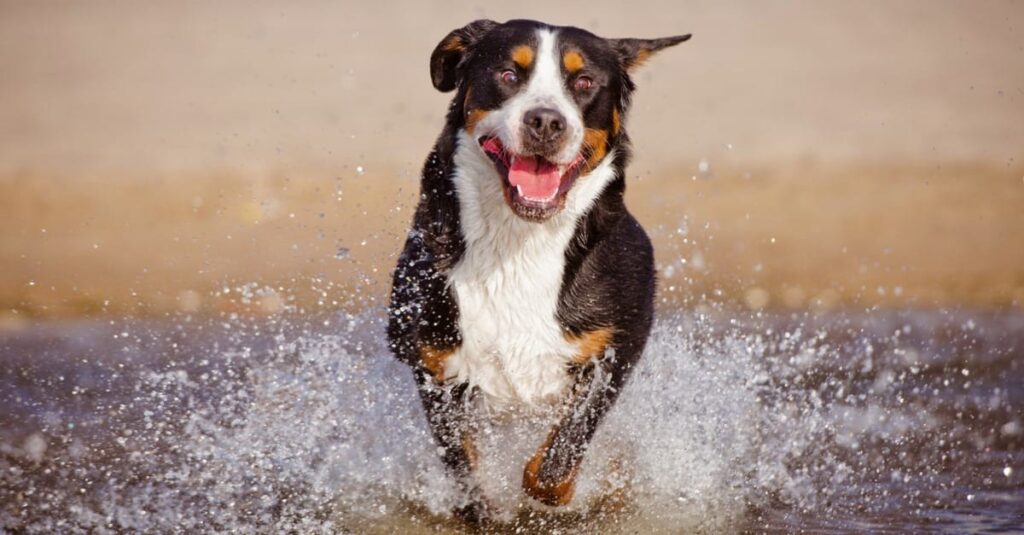Greater Swiss Mountain Dog behavior and temperament
When it comes to choosing a canine companion, understanding their behavior and temperament is crucial. One breed that stands out in this regard is the Greater Swiss Mountain Dog. These magnificent dogs possess a unique combination of traits that make them incredibly loyal, gentle, and intelligent.
Swiss Mountain Dogs are known for their calm and confident demeanor. They have a natural inclination to be friendly and sociable, making them ideal family pets. Despite their large size, they are gentle giants who are great with children and other animals.
One of the key elements of their temperament is their inherent need for a strong bond with their owners. They thrive on human companionship and are happiest when they are included in family activities. This loyal nature makes them excellent watchdogs, as they are always alert and protective of their loved ones.
Some of our latest products...
These dogs also have a strong work ethic and enjoy having a job to do. They were originally bred to be working dogs in the Swiss Alps, where they helped farmers with tasks like pulling carts and herding cattle. This background means that they have a natural drive to please their owners and are highly trainable.
However, it’s important to note that Swiss Mountain Dogs can have a stubborn streak, and consistent and patient training is crucial. With the right approach, using positive reinforcement techniques, they can become well-behaved and obedient companions.
Key Takeaways:
- Greater Swiss Mountain Dogs have a calm and confident temperament.
- They are loyal, gentle, and intelligent.
- Swiss Mountain Dogs are great with children and other animals.
- They thrive on human companionship and are highly trainable.
- Consistent and patient training is key to shaping their behavior.
Understanding Swiss Mountain Dogs
The Swiss Mountain Dog, also known as the Greater Swiss Mountain Dog, is a majestic and powerful breed that has captured the hearts of dog lovers worldwide. To truly appreciate these magnificent canines, it is essential to understand their unique history, physical characteristics, and general personality traits.
History
The Swiss Mountain Dog has a rich heritage that traces back to the Swiss Alps. It is believed that these dogs were originally bred as working companions for Swiss farmers and herders. Their strength, endurance, and agility made them well-suited for pulling carts, guarding livestock, and navigating the rugged mountain terrain.
Today, Swiss Mountain Dogs are still admired for their working abilities, but they have also earned a reputation as beloved family pets due to their gentle nature and loyalty.
Physical Characteristics
Swiss Mountain Dogs are large and muscular, with a solid build that exudes strength and power. Their coats are dense and double-layered, providing insulation from the cold mountain climate.
Here are some key physical characteristics of Swiss Mountain Dogs:
- Height: Males typically measure between 25.5 to 28.5 inches (64.8 to 72.4 cm) at the shoulder, while females are slightly smaller.
- Weight: Adult males weigh between 105 to 140 pounds (47.6 to 63.5 kg), while females range from 85 to 110 pounds (38.6 to 49.9 kg).
- Color: Their coat color is typically black with a white chest, white markings on the face, and tan highlights on the eyebrows and cheeks.
- Expression: Swiss Mountain Dogs have a gentle and intelligent expression, with dark brown eyes that radiate warmth and kindness.
Personality Traits
The Swiss Mountain Dog’s personality is as remarkable as its appearance. Known for their friendly and affectionate nature, these dogs are incredibly loyal and devoted to their families.
Here are some general personality traits of Swiss Mountain Dogs:
- Gentle: Despite their large size, Swiss Mountain Dogs are known for their gentle and patient demeanor, especially with children.
- Protective: They have a natural instinct to protect their loved ones, making them excellent watchdogs.
- Intelligent: Swiss Mountain Dogs are intelligent and eager to please, which makes them highly trainable.
- Sociable: They generally get along well with other dogs and pets when properly socialized from a young age.
These traits make Swiss Mountain Dogs an ideal choice for families seeking a loving and loyal companion who will also excel in various dog sports and activities.
“The Swiss Mountain Dog’s gentle nature, loyalty, and impressive working abilities make them a versatile and cherished breed.”
In the next section, we will explore the importance of socialization and training for Swiss Mountain Dogs and how it contributes to their overall behavior.
Socialization and Training
Proper socialization and training are essential for Swiss Mountain Dogs to develop a well-balanced behavior and positive temperament. Understanding their natural tendencies is crucial in guiding their growth and social integration.
The Importance of Socialization
Puppies of all breeds, including Swiss Mountain Dogs, have a critical socialization period between 3 to 14 weeks of age. This is when they are most receptive to new experiences and influences. Exposing them to a variety of people, animals, and environments during this time will help them become confident and adaptable adults.
Socializing Swiss Mountain Dogs from an early age allows them to develop better tolerance towards unfamiliar situations, reducing the likelihood of fear-based behaviors or aggression in the future. Introducing them to different noises, surfaces, and stimuli can also prevent anxiety and other related issues.
“Proper socialization in the critical early stages can have a lasting impact on a Swiss Mountain Dog’s behavior and overall well-being.”
Training for Behavior Development
Swiss Mountain Dogs are intelligent and eager to please, making them highly trainable. Consistent training provides mental stimulation, helps establish leadership, and sets clear expectations for their behavior.
Positive reinforcement techniques, such as rewards and praise, work best with Swiss Mountain Dogs. They respond well to encouragement and thrive in a positive and supportive training environment. This approach helps foster a strong bond between the dog and their owner, enhancing trust and cooperation.
Basic commands, such as sit, stay, and come, are fundamental for their safety and obedience. Training should also focus on leash manners, as Swiss Mountain Dogs are powerful and may have a tendency to pull. A well-trained Swiss Mountain Dog is a joy to be around, and their good behavior ensures they can participate in various activities with their families.
Expert Tip
Enrolling your Swiss Mountain Dog in a puppy socialization class and obedience training is highly recommended. These classes provide structured environments for socialization while teaching essential skills that will benefit your dog throughout their life.
| Benefits of Socialization and Training | How to Achieve it |
|---|---|
| Reduces fear and anxiety | Expose your dog to new people, animals, and environments regularly |
| Prevents aggression and fear-based behaviors | Create positive associations through rewarding experiences |
| Enhances bonding and cooperation | Use positive reinforcement techniques, such as rewards and praise |
Exercise and Mental Stimulation
Swiss Mountain Dogs are known for their high energy levels and intelligence. Meeting their exercise and mental stimulation needs is essential for maintaining a well-behaved and happy dog.
Regular exercise is crucial to prevent boredom and channel their energy in a positive way. Aim for at least 1-2 hours of physical activity each day, which can include brisk walks, jogging, hiking, or playing in a securely fenced yard. Additionally, engaging in interactive games, such as fetch or agility training, can further stimulate their minds and provide a sense of purpose.
In addition to physical exercise, Swiss Mountain Dogs require mental stimulation to keep their sharp minds engaged. Puzzle toys, interactive feeders, and obedience training sessions are effective ways to challenge their intellect and prevent boredom-related behavior issues. Teaching them new commands, tricks, or participating in canine sports like obedience or rally can further provide mental exercise and strengthen the bond between you and your Swiss Mountain Dog.
Remember, a well-exercised and mentally stimulated Swiss Mountain Dog is a well-behaved and content companion!
Examples of Mental Stimulation Activities:
- Hide and seek with treats or toys
- Scent tracking games
- Clicker training sessions
- Introducing new environments or objects
- Engaging in interactive play sessions
Benefits of Exercise and Mental Stimulation:
- Prevents destructive behavior
- Reduces anxiety and stress
- Improves overall physical health
- Enhances mental well-being
- Strengthens the bond between you and your dog
| Physical Exercise Tips | Mental Stimulation Tips |
|---|---|
| 1. Provide daily walks to fulfill their exercise needs. | 1. Invest in puzzle toys to keep their minds engaged. |
| 2. Allow them to run off-leash in a secure area. | 2. Rotate their toys to prevent boredom. |
| 3. Engage in active playtime sessions, such as playing fetch or tug-of-war. | 3. Incorporate obedience training sessions into their daily routine. |
| 4. Consider enrolling them in agility or obedience classes. | 4. Create scavenger hunts for them to find treats or toys. |
Behavior Issues and Solutions
Swiss Mountain Dogs are generally well-mannered and gentle, but like any dog breed, they can sometimes exhibit behavior issues. It is important for owners to understand these behaviors and have solutions in place to address them effectively. In this section, we will explore some common behavior issues that Swiss Mountain Dog owners may encounter and provide insights on how to manage and correct them.
Separation Anxiety
One behavior issue that Swiss Mountain Dogs may experience is separation anxiety. This occurs when the dog becomes distressed or anxious when left alone. Signs of separation anxiety include excessive barking, destructive behavior, and house soiling.
To help manage separation anxiety, it is important to gradually acclimate your Swiss Mountain Dog to being alone. Start with short periods of separation and gradually increase the duration over time. Provide plenty of mental and physical stimulation before leaving and consider using interactive toys or puzzle feeders to keep them occupied. Additionally, creating a safe and comfortable space for your dog when you’re away, such as a designated area with their bed and favorite toys, can help alleviate anxiety.
Aggression
While Swiss Mountain Dogs are generally friendly and gentle, some individuals may display aggression towards other animals or humans. Aggression can manifest as growling, snarling, or even biting. It is important to address aggressive behavior promptly to prevent any potential harm.
If your Swiss Mountain Dog shows signs of aggression, consult with a professional dog trainer or behaviorist who can assess the situation and provide guidance tailored to your dog’s specific needs. They may recommend behavior modification techniques, such as desensitization and counterconditioning, to help your dog overcome their aggression triggers. It is crucial to always prioritize the safety of both your dog and those around them.
Leash Reactivity
Leash reactivity is another common behavior issue that Swiss Mountain Dogs may exhibit. This occurs when a dog becomes reactive, such as barking, lunging, or pulling on the leash, when encountering other dogs or stimuli while on a walk.
To address leash reactivity, consistent and positive reinforcement training is key. Start by teaching your Swiss Mountain Dog basic obedience commands, such as “sit,” “stay,” and “leave it.” Gradually expose them to controlled situations where they may encounter triggers and reward calm behavior with treats and verbal praise. It may also be helpful to use a front-clip harness or head halter to provide better control during walks. Seeking guidance from a professional trainer can further assist in managing leash reactivity.
Swiss Mountain Dogs are highly trainable and respond well to positive reinforcement techniques. With patience, consistency, and proper guidance, these behavior issues can be effectively managed and improved.
| Behavior Issue | Solutions |
|---|---|
| Separation Anxiety | – Gradual acclimation to being alone – Providing mental and physical stimulation – Creating a comfortable space – Using interactive toys or puzzle feeders |
| Aggression | – Consult with a professional trainer or behaviorist – Behavior modification techniques – Prioritizing safety |
| Leash Reactivity | – Consistent and positive reinforcement training – Teaching basic obedience commands – Gradual exposure to triggers – Rewarding calm behavior – Using aids like a front-clip harness or head halter |
Living with Children and Other Pets
Swiss Mountain Dogs are known for their gentle and friendly nature, making them great companions for children and other pets. Their calm and patient temperament ensures they can coexist harmoniously in a household filled with little ones and furry friends.
When introducing a Swiss Mountain Dog to children, it’s essential to teach both the dog and the child proper behavior and boundaries. Supervised interactions are crucial to ensure the safety of both parties. Children should be taught to respect the dog’s space and not to engage in rough play. Similarly, the dog should be trained to be gentle and patient around children.
Swiss Mountain Dog’s gentle nature makes them great companions for children and other pets.
“Swiss Mountain Dogs are incredibly tolerant and patient, which makes them well-suited for families with children. They have a natural instinct to protect and care for their loved ones,” says Sarah Thompson, a Swiss Mountain Dog owner.
When it comes to introducing a Swiss Mountain Dog to other pets, early socialization is key. Proper introductions and gradual introductions can help establish positive relationships. It’s important to create a calm and controlled environment during the initial meetings to reduce any potential stress or anxiety.
- Provide each pet with their individual space and resources, such as food, water, and toys.
- Monitor their interactions closely and intervene if necessary to prevent any conflicts.
- Gradually increase the duration and frequency of their interactions as they become more comfortable with each other.
Remember, every dog and every pet is unique, and the success of their interactions depends on their individual personalities and experiences. It’s important to be patient and observe their body language to ensure a harmonious coexistence.
To help you visualize the compatibility of Swiss Mountain Dogs with children and other pets, here’s an adorable image of a Swiss Mountain Dog peacefully coexisting with a child and another pet:
Health and its Impact on Behavior
When it comes to Swiss Mountain Dogs, understanding the connection between health and behavior is crucial. Just like humans, a dog’s physical well-being can greatly influence their behavior and temperament. Certain health issues can manifest in behavioral changes, so it’s important for owners to be aware of these potential impacts.
Common health issues that may affect Swiss Mountain Dog behavior include:
- Allergies
- Joint problems
- Digestive disorders
- Hormonal imbalances
- Neurological conditions
When Swiss Mountain Dogs are experiencing discomfort or pain due to these health issues, it can result in changes in their behavior. For example, a dog with joint problems may become irritable or less active, while one with allergies may exhibit excessive scratching or licking.
In order to maintain the overall well-being and balanced behavior of Swiss Mountain Dogs, it is important for owners to prioritize their pet’s health. Regular veterinary check-ups, a nutritious diet, and appropriate exercise can go a long way in promoting good health and preventing potential behavior issues.
Key Factors to Consider
- Recognizing signs of potential health problems: Familiarize yourself with the common health issues that Swiss Mountain Dogs may face. By being attuned to any changes in your dog’s behavior, appetite, or physical condition, you can identify potential health concerns early on.
- Regular veterinary care: Schedule routine visits with a veterinarian to monitor your dog’s health and address any potential issues promptly. Regular check-ups, vaccinations, and preventative measures can help maintain your Swiss Mountain Dog’s overall well-being.
- Nutrition and exercise: Provide a balanced and nutritious diet to support your dog’s health. Consult with your veterinarian to determine the appropriate diet for your Swiss Mountain Dog’s age, size, and specific health needs. Additionally, ensure your dog receives regular exercise to promote physical and mental stimulation.
By prioritizing the health of your Swiss Mountain Dog, you not only contribute to their overall well-being but also help prevent potential behavior issues that can arise from underlying health problems.
Remember, a healthy dog is a happy dog!
| Common Health Issues | Behavioral Impacts |
|---|---|
| Allergies | Excessive scratching or licking |
| Joint problems | Irritability, reduced activity |
| Digestive disorders | Changes in appetite, discomfort |
| Hormonal imbalances | Mood swings, aggression |
| Neurological conditions | Behavioral changes, coordination problems |
Positive Reinforcement Techniques
When it comes to training Swiss Mountain Dogs, positive reinforcement techniques have proven to be highly effective. By utilizing rewards and praise, you can shape desired behaviors and establish a strong bond with these intelligent and eager-to-please canines. Unlike harsh disciplinary methods, positive reinforcement focuses on encouraging good behavior rather than punishing bad behavior, creating a positive and enjoyable learning experience for both you and your Swiss Mountain Dog.
One of the key benefits of positive reinforcement is that it helps to foster a trusting and respectful relationship with your Swiss Mountain Dog. By rewarding them for displaying the behaviors you want, such as sitting or staying, you communicate your expectations in a clear and rewarding way. Over time, they will associate these positive experiences with certain behaviors, making them more likely to repeat them.
“Using positive reinforcement techniques, such as treats, belly rubs, and verbal praise, can be incredibly motivating for Swiss Mountain Dogs. They thrive on positive attention and are quick to grasp new concepts when rewarded.”
When implementing positive reinforcement training, it’s important to choose rewards that are highly enticing to your Swiss Mountain Dog. This could include small, tasty treats or their favorite toys. The key is to find what motivates your dog and use that as a reward for their good behavior.
Consistency is another crucial aspect of positive reinforcement training. By consistently rewarding desired behaviors and ignoring or redirecting unwanted behaviors, you send a clear message to your Swiss Mountain Dog about what is expected of them. This helps to create a routine and reinforce the behaviors you want to see more of.
Although positive reinforcement techniques are effective, it’s important to note that every dog is unique, and what works for one may not work for another. Some Swiss Mountain Dogs may respond better to verbal praise, while others may be more motivated by treats. It’s essential to experiment and find the rewards that work best for your dog.
By utilizing positive reinforcement techniques, you can create a harmonious and well-behaved Swiss Mountain Dog. The key is to provide consistent, rewarding experiences that motivate and encourage desired behaviors. With time, patience, and plenty of positive reinforcement, you can shape your Swiss Mountain Dog’s behavior and build a lifelong bond based on trust and respect.
Conclusion
In conclusion, understanding the behavior and temperament of Greater Swiss Mountain Dogs is essential for anyone considering this breed as a companion. These majestic canines have a unique set of traits that contribute to their overall personality and make them such wonderful companions.
Greater Swiss Mountain Dogs are known for their gentle and friendly nature, making them great family pets. They exhibit a calm and patient demeanor, especially when interacting with children and other pets. Their loyalty and protective instincts also make them excellent guardians and watchdogs.
Proper socialization and training are key to shaping the behavior of Swiss Mountain Dogs. With their high energy levels and intelligence, it’s important to provide them with regular exercise and mental stimulation. Positive reinforcement techniques, such as rewards and praise, are effective in teaching them desired behaviors and strengthening the bond between these dogs and their owners.
Overall, Greater Swiss Mountain Dogs bring joy, companionship, and a sense of security to the lives of their owners. By understanding and respecting their unique behavior and temperament, we can ensure a harmonious relationship with these magnificent dogs.
FAQ
Why is understanding Swiss Mountain Dog behavior important?
Understanding Swiss Mountain Dog behavior is crucial for creating a harmonious relationship with these dogs. It allows owners to meet their needs, address any behavior issues, and provide proper training and socialization.
What is the temperament of a Swiss Mountain Dog like?
Swiss Mountain Dogs have a calm and gentle temperament. They are known for their loyalty, friendliness, and affectionate nature. They are also highly intelligent and eager to please their owners.
What are some general personality traits of Swiss Mountain Dogs?
Swiss Mountain Dogs are known for their confident and self-assured nature. They are protective of their loved ones and make excellent family dogs. They have a strong work ethic and enjoy having a job or task to fulfill.
How should Swiss Mountain Dogs be socialized and trained?
Swiss Mountain Dogs should be socialized from an early age to ensure they are comfortable and well-behaved in various situations. Training should be positive and reward-based, utilizing their intelligence and desire to please.
What exercise and mental stimulation do Swiss Mountain Dogs require?
Swiss Mountain Dogs are a high-energy breed and need regular exercise to keep them physically and mentally stimulated. This can include long walks, running, hiking, and engaging in interactive games or puzzles.
What are some common behavior issues in Swiss Mountain Dogs?
Swiss Mountain Dogs may exhibit behaviors such as separation anxiety, territorial aggression, or excessive barking if not properly managed. Early intervention and consistent training can help address these issues.
Are Swiss Mountain Dogs good with children and other pets?
Yes, Swiss Mountain Dogs are generally good with children and other pets, particularly if socialized from a young age. They are known for their gentle nature and can form strong bonds with all members of the family.
How does health affect Swiss Mountain Dog behavior?
Health issues in Swiss Mountain Dogs can impact their behavior. Pain or discomfort from conditions such as hip dysplasia or allergies can cause irritability or changes in temperament. Regular veterinary care is essential for their overall well-being.
What are positive reinforcement techniques and why are they effective?
Positive reinforcement techniques involve rewarding desired behaviors with treats, praise, or play. These techniques are effective with Swiss Mountain Dogs as they respond well to positive feedback and are motivated by rewards.







